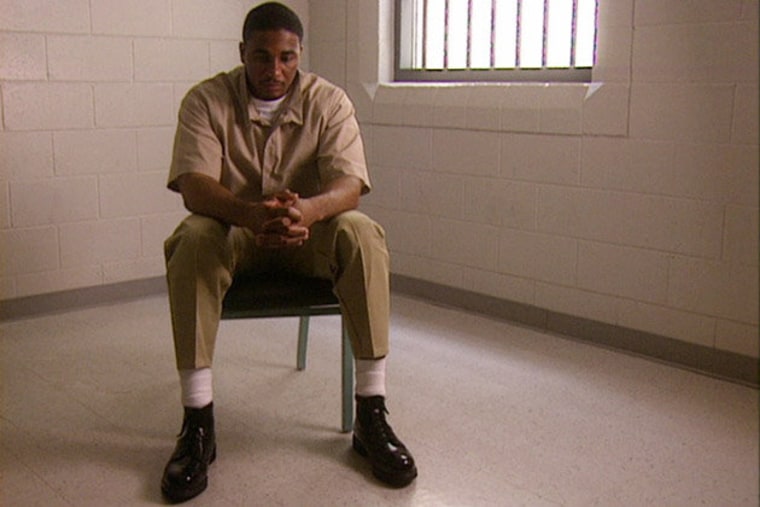Clarence Aaron has been in prison since the early nineties, serving a sentence to three consecutive life terms without parole. With that kind of sentence, it is a sad truth that men like Aaron are tossed into the trash heap of society. That heap is not simply the prison itself, but a stigma created by the prison, and the incredibly harsh sentence, given the crime of which Aaron was accused and convicted.
Guys like Aaron are usually written off forever as a lost cause. So why are we still talking about him?
A lot of it has to do with the crime itself, and a twisted variation of the chicken-and-egg theory: which came first, the crime, or the criminal? While not wholly clean, this case seems to deem Aaron liable for others' actions, and even more so than them. In her detailed investigative reporting for ProPublica, Dafna Linzer sums up Aaron's crime:
Aaron stumbled into the "war on drugs" near its peak, in 1992. Then a linebacker at Southern University in Baton Rouge, he introduced a classmate whose brother was a drug supplier to a cocaine dealer he knew from high school in Mobile, Ala.Aaron was present for the sale of nine kilograms of cocaine and the conversion of one kilogram to crack, according to court records. He was paid $1,500 by the dealer.
Not good, but it was shocking to many when Aaron received the harshest sentence of the three men -- so it's not surprise that just before George W. Bush was inaugurated as President in 2001, Aaron's attorneys filed for his sentence to be commuted, to no avail. (See ProPublica's timeline for the Aaron case here.) Now, the odds to receive a presidential commutation are incredibly low; as Linzer notes, President Obama has rejected nearly 3,800 commutation requests from prisoners, and has approved one; President George W. Bush commuted 11 sentences out of nearly 7,500 contenders.
That said, Aaron's case sounds like a perfect recipe for commutation to many -- including the U.S. District Judge who administered that sentence, and almost four years ago, advocated for Aaron's release:
"Looking through the prism of hindsight, and considering the many factors argued by the defendant that were not present at the time of his initial sentencing, one can argue that a less harsh sentence might have been more equitable..."
There may be many reasons why Aaron hasn't been pardoned. We now know one, thanks to Linzer's reporting: the U.S. Pardon Attorney's office, a part of the Justice Department, submitted an incomplete report during the waning days of the Bush 43 administration to the White House:
Records show that Ronald Rodgers, the current pardon attorney, left out critical information in recommending that the White House deny Aaron's application. In a confidential note to a White House lawyer, Rodgers failed to accurately convey the views of the prosecutor and judge and did not disclose that they had advocated for Aaron's immediate commutation.Kenneth Lee, the lawyer who shepherded Aaron's case on behalf of the White House, was aghast when ProPublica provided him with original statements from the judge and prosecutor to compare with Rodgers's summary. Had he read the statements at the time, Lee said, he would have urged Bush to commute Aaron's sentence."This case was such a close call," Lee said. "We had been asking the pardons office to reconsider it all year. We made clear we were interested in this case."
It seems to me that Aaron, having already served about 20 years, has overpaid whatever debt he owed to society -- but whether he should be a free man is, I'll allow, up for debate. Even if you judge that he should, as ProPublica also reported in December, white prisoners are just about four times as likely to be pardoned as black prisoners. All that said, though the odds be stacked against him, these new revelations only underscore that there's no reason why Aaron shouldn't get a fair shot at saving his own life.
I'd recommend reading the entire Linzer story either in ProPublica or the Washington Post, and watching the 1999 FRONTLINE report (above) about Aaron. Click below the jump for our daily reads.
Today's must-read blog of the day is by our guest this upcoming Saturday, the Washington Post's Ezra Klein, shaking his head:
“If you look at the fundamentals,” writes David Brooks, “the president should be getting crushed right now.” The rest of the column is an attempt to explain why President Obama isn’t getting crushed right now..."Pundits take political situations that can be explained through the fundamentals and then attribute them, without any evidence, to the telegenic characteristics of individual politicians or the messaging decisions made by their campaigns.
You'll also want to check out Ezra's interview with Sen. Tom Coburn (R-OK) about the debt, especially considering that House Speaker John Boehner is considering holding the government hostage again using the debt limit. Also worth a read are Public Enemy's Chuck D's comments on marriage equality, the conservative Club for Growth's harsh grades for so-called "Tea Party" freshmen in Congress, a look at whether Sen. Rob Portman (R-OH) is the best of the "boring white guys" for GOP VP, and feminist author Jessica Valenti's column on why this is the "year of the young woman":
Our fights are largely self-directed and loosely organized; they’re micromovements, built over the course of days or a week organically and without institutional direction. The Feminist Majority Foundation and Planned Parenthood aren’t driving these conversations and actions—American women are.But bringing down Rush Limbaugh and getting a transvaginal ultrasound mandate removed from state legislation is not the same as game-changing policy—we need institutional power and backing to do that. Maybe now is the moment we can actually have it.
Lastly, Melissa's Mother's Day discussion about mothers in prison seems an appropriate way to conclude this post. Watch it below.
